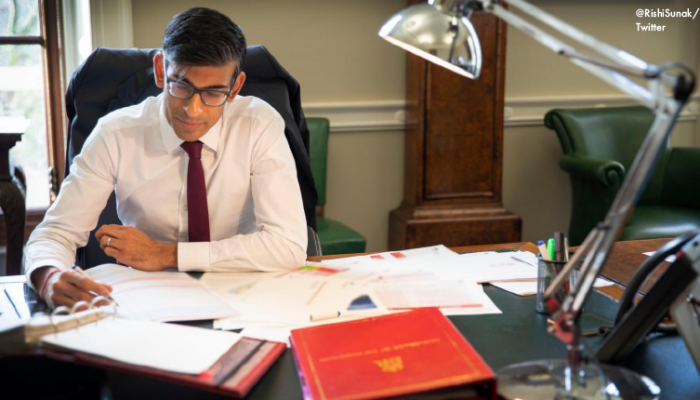What to expect from Rishi Sunak’s first Budget?
The first Budget for 16 months will be delivered on Wednesday 11 March by Chancellor Rishi Sunak, who has only been in the post for three weeks. Sunak’s appointment swiftly followed the resignation from Government of Sajid Javid in the recent reshuffle, when he chose to walk away rather than sign up to a new joint Number 10 and Number 11 Downing Street team, which would have involved firing his team of advisers.
With a previous Budget set for November 2019 cancelled due to the parliamentary hiatus over Brexit and the subsequent General Election, this Budget, as well as being delivered by a newly appointed Chancellor, is also set to be dominated by the COVID-19 Coronavirus outbreak, which is predicted to escalate into a global pandemic.
Civil Service World reported that the Chancellor was ‘being forced to rewrite next week’s Budget to take account of the likely economic effect of the Covid-19 outbreak.’ This is expected to include additional cash for the NHS and other public services. It might also include a tax holiday for businesses that will be widely affected by any economic downturn due to the virus.
Travel and commuting restrictions, reduced imports from overseas, including the far east where the virus originated, and a self-exclusion plan that might have to come into force, would all have a significant effect on the UK economy and the Treasury is being asked to step up and make guarantees to businesses and citizens.
The Budget is also expected to formalise the Conservative manifesto pledge to raise the threshold at which people start paying National Insurance Contributions (NICs) by more than 10% to £9,500. If confirmed at this rate, a typical employee will save around £104 in 2020/21, while self-employed individuals, who pay a lower rate, will have £78 cut from their bill, according to Government figures.
A key aim of this Government’s mission is to ‘level up’ spending across Britain and to reduce regional disparity through increased spending and better infrastructure, not least in the former Labour heartland seats that the Conservatives won in 2019 and now seek to retain at the next election.
One likely way to find extra cash is to scrap Entrepreneurs’ relief. This tax relief brought in by Labour in 2008 and subsequently extended by George Osborne, allows business owners when they sell their company to pay capital gains tax at a reduced rate of 10% rather than the usual rate of 20%, which applies to gains up to £10m.
The Sun reports that this could have serious effects on SMEs including retailers selling a shop for £150,000 who would lose £15,000 if the plans go ahead. The proposal is apparently unpopular with some backbench MPs and The Sun quotes national chairman of the Federation of Small Businesses (FSB) Mike Cherry, who said: ‘Scrapping entrepreneurs’ relief would destroy the retirements of thousands of business owners. The Conservative manifesto committed this Government to reviewing and reforming this incentive, not scrapping it entirely. The Conservatives should keep their promises – it’s a question of trust.’
The FSB spokesperson suggests a compromise: ‘Keep the relief for the first £1m of a business sale and scale it back at the top end. Doing so would save the Treasury more than £1bn and maintain a vital incentive which encourages entrepreneurs to start up, hire and invest.’
In a dig at the authors of the likely policy to scrap the relief entirely he adds: ‘A lot of entrepreneurs see their business as their retirement plan. They don’t have the gold-plated pensions enjoyed by Treasury civil servants.’
Mike Cherry also said that small business confidence has already suffered a slump over the past 18 months and this proposal risks making a bad situation worse for small businesses, and risks losing them to other more welcoming tax jurisdictions.
The Financial Times reports (£) that Sunak could use the Budget to end the freeze on fuel duty which has been in place since 2010 or at least start by removing the £2.4bn subsidy for ‘red diesel’. This is used by off-road vehicles and machinery and would demonstrate that the Treasury is prepared to use the tax system to encourage a move away from fossil fuels.
A Daily Telegraph pre-Budget analysis predicts that ‘Changes to tax, pensions, housing and social care’ are all set to be included. It also speculates that additional funding for adult social care could be included as well as measures to increase the roll out of high-speed broadband and reduce single-use plastics.
Changes to pension contributions have been suggested as an idea alongside a wealth or ‘mansion tax’, but it is understood that Rishi Sunak took these proposals off the table when he became Chancellor. A scheme to cut the cost of buying a home for key workers and first-time buyers would perhaps prove more popular nationally to ensure that renters can buy a home in their area at a reduced rate.
As with many across the country and especially public affairs professionals, we will watch with interest on Wednesday as with previous Budgets, to see if this newbie Chancellor has a rabbit to pull out of his hat in terms of a key announcement that will get everyone talking and, unlike the pasty tax or caravan tax of the George Osborne era, won’t unravel as soon as the journalists and financial experts crunch the numbers in detail.
**
The Vuelio Political team will be summarising the Budget and stakeholder reaction to all of the key announcements and measures.
Sign up to receive your complimentary copy of The Budget Summary and Reaction.
**






Leave a Comment